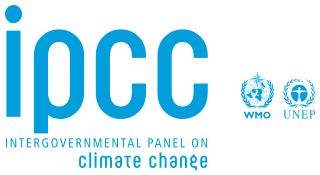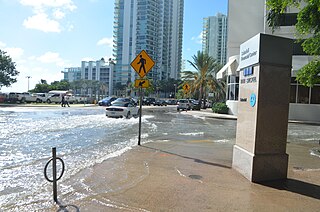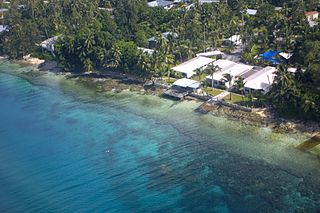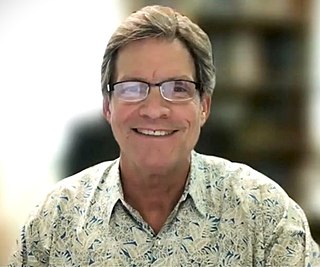
Mean sea level is an average surface level of one or more among Earth's coastal bodies of water from which heights such as elevation may be measured. The global MSL is a type of vertical datum – a standardised geodetic datum – that is used, for example, as a chart datum in cartography and marine navigation, or, in aviation, as the standard sea level at which atmospheric pressure is measured to calibrate altitude and, consequently, aircraft flight levels. A common and relatively straightforward mean sea-level standard is instead the midpoint between a mean low and mean high tide at a particular location.

There is a strong scientific consensus that the Earth is warming and that this warming is mainly caused by human activities. This consensus is supported by various studies of scientists' opinions and by position statements of scientific organizations, many of which explicitly agree with the Intergovernmental Panel on Climate Change (IPCC) synthesis reports.
Climate Change 2007, the Fourth Assessment Report (AR4) of the United Nations Intergovernmental Panel on Climate Change (IPCC), was published in 2007 and is the fourth in a series of reports intended to assess scientific, technical and socio-economic information concerning climate change, its potential effects, and options for adaptation and mitigation. The report is the largest and most detailed summary of the climate change situation ever undertaken, produced by thousands of authors, editors, and reviewers from dozens of countries, citing over 6,000 peer-reviewed scientific studies. People from over 130 countries contributed to the IPCC Fourth Assessment Report, which took six years to produce. Contributors to AR4 included more than 2,500 scientific expert reviewers, more than 800 contributing authors, and more than 450 lead authors.

Bret Louis Stephens is an American conservative journalist, editor, and columnist. He has been an opinion columnist for The New York Times and a senior contributor to NBC News since 2017. Since 2021, he has been the inaugural editor-in-chief of SAPIR: A Journal of Jewish Conversations.

Hell and High Water: Global Warming – the Solution and the Politics – and What We Should Do is a book by author, scientist, and former U.S. Department of Energy official Joseph J. Romm, published December 26, 2006. The author is "one of the world's leading experts on clean energy, advanced vehicles, energy security, and greenhouse gas mitigation."

Timothy Raymond Naish is a New Zealand glaciologist and climate scientist who has been a researcher and lecturer at Victoria University of Wellington and the Director of the Antarctic Research Centre, and in 2020 became a programme leader at the Antarctic Science Platform. Naish has researched and written about the possible effect of melting ice sheets in Antarctica on global sea levels due to high CO2 emissions causing warming in the Southern Ocean. He was instrumental in establishing and leading the Antarctica Drilling Project (ANDRILL), and a Lead Author on the Intergovernmental Panel on Climate Change (IPCC) 5th Assessment Report (2014).

The IPCC Fourth Assessment Report (AR4) is a report on climate change created with the help of a large number of contributors, both scientists and governmental representatives. There has been considerable political controversy over a small number of errors found in the report, and there have been calls for review of the process used to formulate the report. The overwhelming majority view of scientists with expertise in climate change is that errors, when found, are corrected, and the issues as identified do not undermine the conclusions of the report that the climate system is warming in response to increased levels of greenhouse gases, largely due to human activities.
The effects of climate change in Florida are attributable to man-made increases in atmospheric carbon dioxide. Floridians are experiencing increased flooding due to sea level rise, and are concerned about the possibility of more frequent or more intense hurricanes.

The Fifth Assessment Report (AR5) of the United Nations Intergovernmental Panel on Climate Change (IPCC) is the fifth in a series of such reports and was completed in 2014. As had been the case in the past, the outline of the AR5 was developed through a scoping process which involved climate change experts from all relevant disciplines and users of IPCC reports, in particular representatives from governments. Governments and organizations involved in the Fourth Report were asked to submit comments and observations in writing with the submissions analysed by the panel. Projections in AR5 are based on "Representative Concentration Pathways" (RCPs). The RCPs are consistent with a wide range of possible changes in future anthropogenic greenhouse gas emissions. Projected changes in global mean surface temperature and sea level are given in the main RCP article.

Between 1901 and 2018, the average global sea level rose by 15–25 cm (6–10 in), or an average of 1–2 mm per year. This rate accelerated to 4.62 mm/yr for the decade 2013–2022. Climate change due to human activities is the main cause. Between 1993 and 2018, thermal expansion of water accounted for 42% of sea level rise. Melting temperate glaciers accounted for 21%, with Greenland accounting for 15% and Antarctica 8%. Sea level rise lags changes in the Earth's temperature. So sea level rise will continue to accelerate between now and 2050 in response to warming that is already happening. What happens after that will depend on what happens with human greenhouse gas emissions. Sea level rise may slow down between 2050 and 2100 if there are deep cuts in emissions. It could then reach a little over 30 cm (1 ft) from now by 2100. With high emissions it may accelerate. It could rise by 1 m or even 2 m by then. In the long run, sea level rise would amount to 2–3 m (7–10 ft) over the next 2000 years if warming amounts to 1.5 °C (2.7 °F). It would be 19–22 metres (62–72 ft) if warming peaks at 5 °C (9.0 °F).

Climate change is particularly threatening for the long-term habitability of the island country of Tuvalu, which has a land area of only 26 square kilometres (10 sq mi) and an average elevation of less than 2 metres (6.6 ft) above sea level, with the highest point of Niulakita being about 4.6 metres (15 ft) above sea level. Potential threats to the country due to climate change include rising sea levels, increasingly severe tropical cyclones, high temperatures, and drought.

Straight Up: America's Fiercest Climate Blogger Takes on the Status Quo Media, Politicians, and Clean Energy Solutions is a book by author, blogger, physicist and climate expert Joseph J. Romm. A Fellow of the American Association for the Advancement of Science and former Acting Assistant Secretary of the U.S. Department of Energy, Romm writes about methods of reducing global warming and increasing energy security through energy efficiency, green energy technologies and green transportation technologies.

The North Shore, in the context of geography of the Island of Oʻahu, refers to the north-facing coastal area of Oʻahu between Kaʻena Point and Kahuku. The largest settlement is Haleʻiwa.

Coastal flooding occurs when dry and low-lying land is submerged (flooded) by seawater. The range of a coastal flooding is a result of the elevation of floodwater that penetrates the inland which is controlled by the topography of the coastal land exposed to flooding. The seawater can flood the land via several different paths: direct flooding, overtopping of a barrier, or breaching of a barrier. Coastal flooding is largely a natural event. Due to the effects of climate change and an increase in the population living in coastal areas, the damage caused by coastal flood events has intensified and more people are being affected.

The effect of climate change on small island countries can be extreme because of low-lying coasts, relatively small land masses, and exposure to extreme weather. The effects of climate change, particularly sea level rise and increasingly intense tropical cyclones, threaten the existence of many island countries, island peoples and their cultures, and will alter their ecosystems and natural environments. Several Small Island Developing States (SIDS) are among the most vulnerable nations to climate change.

Tidal flooding, also known as sunny day flooding or nuisance flooding, is the temporary inundation of low-lying areas, especially streets, during exceptionally high tide events, such as at full and new moons. The highest tides of the year may be known as the king tide, with the month varying by location. These kinds of floods tend not to be a high risk to property or human safety, but further stress coastal infrastructure in low lying areas.

Andrea Dutton, a 2019 MacArthur Fellow, is a Professor of Geology in the Department of Geoscience at the University of Wisconsin–Madison where she studies paleoclimate, sedimentology, carbonate geochemistry, and paleoceonagraphy. Her primary research investigates sea level changes during interglacial periods to predict future sea level rise.

Climate change in the Marshall Islands is a major issue for the country. As with many countries made up of low-lying islands, the Marshall Islands is highly vulnerable to sea level rise and other impacts of climate change. The atoll and capital city of Majuro are particularly vulnerable, and the issue poses significant implications for the country's population. These threats have prompted Marshallese political leaders to make climate change a key diplomatic issue, who have responded with initiatives such as the Majuro Declaration.
Sea level rise in New Zealand poses a significant threat to many communities, including New Zealand's larger population centres, and has major implications for infrastructure in coastal areas. In 2016, the Royal Society of New Zealand stated that a one-metre rise would cause coastal erosion and flooding, especially when combined with storm surges. Climate scientist Jim Salinger commented that New Zealand will have to abandon some coastal areas when the weather gets uncontrollable. Twelve of the fifteen largest towns and cities in New Zealand are coastal with 65% of communities and major infrastructure lying within five kilometres of the sea. The value of local government infrastructure that is vulnerable to sea level rise has been estimated at $5 billion. As flooding becomes more frequent, coastal homeowners will experience significant losses and displacement. Some may be forced to abandon their properties after a single, sudden disaster like a storm surge or flash flood or move away after a series of smaller flooding events that eventually become intolerable. Local and central government will face high costs from adaptive measures and continued provision of infrastructure when abandoning housing may be more efficient.

Charles H. Fletcher III is an American climate scientist and geologist. He studies sea level rise and shoreline change with a particular focus on how climate change will affect communities in the Pacific Islands. In addition to his research, Fletcher advocates for human adaptation to sea level rise.

















